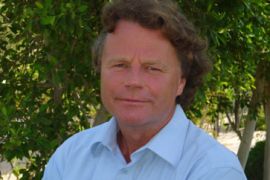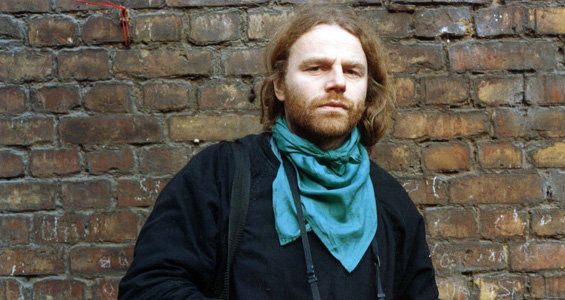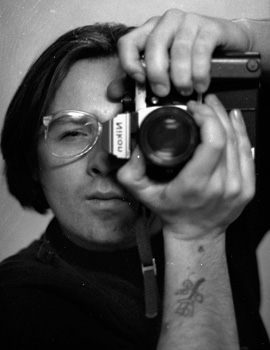‘I was very angry for 30 years’
The fist to cross from East to West, Siegbert Schefke struggles to forgive former GDR officials.

 |
| Siegbert Schefke, shown here in 1989, was the first to cross the border [Robert Havemann Society] |
Many events, large and small, in the East and the West, helped to bring the Cold War to a peaceful end.
But it is the events of November 9, 1989, that the world remembers.
The 154km of reinforced concrete and barbed wire, enclosing half a city, came to symbolise a government that could not trust its own people.
For the second time in the 20th century Berlin hosted the last battle in a global war. But this time, instead of laying in ruins, it stood unscathed. Rather than clearing rubble and building from scratch, Germany became a whole country again in less than a year.
Al Jazeera spoke to people who are witnesses to that period, their lives shaped by the political divide that dominated the second half of the 20th century. In turn, they helped to shape those events that the world celebrates on Monday, November 9, 2009.
| Special report |
|
|
The two men met for the first time in 20 years when they appeared together on television three weeks ago for a story about the Berlin Wall.
The older man, Harald Jäger, apologised to the younger, Siegbert Schefke.
“I was very angry with Jäger and his comrades for 30 years,” Schefke, 50, explained later on.
“After all, he’d been actively seeing to it that I was a prisoner of the GDR.”
The last time the two men had squared off, it was at the Bornholmerstrasse checkpoint, November 9, 1989, the night the Berlin Wall fell.
Jäger was the officer in charge and Schefke was at the head of the angry crowd demanding to be let through.
“That’s right, I apologised,” Jäger, 66, said. “But not for anything that happened on November 9. He and his friend Aram [Radomski] had suffered a lot at the hands of the Stasi. They were given a hard time. I always had the feeling he was unwilling to forgive.”
Beginning of the end
 |
| Schefke, fourth from left, caught by a hidden Stasi camera [Robert Havemann Society] |
Schefke is famous in Germany for having, with his friend Radomski, secretly filmed the demonstrations in Leipzig, where for the first time, the East German police did not intervene in open anti-government protests.
They smuggled the film to the West, where it was broadcast the next day under the headline, “The beginning of the end of the Communist regime”. It was activities like this that made him a prime target of the dreaded Stasi secret police.
But he also has another claim to fame: he was the first East German to cross to the West the night the Berlin Wall fell.
After seeing the press conference at which Communist official Günther Schabowski mistakenly announced that East Germans were free to travel immediately, Schefke and Radomski went to their local pub in Prenzlauerberg, near the wall, to share the news with their friends.
No one believed them.
“We said to our friends, ‘If we’re not back in an hour, then we’re in the West and we’ll meet at midnight at Cuckoo’s Nest bar in [the Western suburb of] Kreuzberg.’ Everybody laughed and scoffed, ‘Aram and Siggi are going to the West, ha ha …'”
‘Indescribable happiness’
He spent a tense few hours arguing with Jäger before the border guard bowed to people power and began letting the crowds through.
 |
| Aram Radomski crossed the border with Schefke [Robert Havemann Society] |
“I remember we just kept quoting Schabowski. Jäger was saying, ‘No, no, no’.
“Then Aram and I were the first through. At first I thought, we’ll go over the bridge and at the end will be a Stasi van and we’ll be arrested. I didn’t believe we were free until we were sitting in a Mercedes taxi.
“We spent the night with the friends who’d laughed at us and partied right through to morning. I then spent four days in West Berlin.
“The happiness is indescribable, even just with this anniversary. I was always hoping and fighting for the end of the GDR. On November 9, I just thought, ‘It is done’, but I couldn’t quite come to terms with the fact.”
Nowadays, Schefke is a news editor at Mitteldeutscher Rundfunk, the public broadcaster based in Leipzig. He says he is “very, very happy” with life after the GDR.
His friend Radomski runs his own company and “earns millions,” his wife is from the West and his children go to a British school in Leipzig.
No choice
While many Germans, Easterners and Westerners alike, complain that reunification has been a bumpy road, or even a mistake, Schefke is unremittingly positive.
To those who say reunification was rushed or badly implemented, he retorts that there was no choice.
“The GDR had economically collapsed.”
So what did he say to Harald Jäger? Did he accept his apology?
“I believe Jäger is … grateful to me, because we convinced him and not the other way around,” he said.
After some thought, he added: “I accepted it, and yet I can’t accept it.”
